the tar sands are too expensiveAlberta could become the next Saudi Arabia if they separated
The path for a referendum on Alberta separation has been laid out
- Thread starter Phil C. McNasty
- Start date
Like I said in another thread, This is all Trump pulling strings.
Highly unlikely a separation happens in Canada, but it shows Trump has the buttons to push that can cause Carney major grief.
Highly unlikely a separation happens in Canada, but it shows Trump has the buttons to push that can cause Carney major grief.
No, this is more about Smith misreading the room.Like I said in another thread, This is all Trump pulling strings.
Highly unlikely a separation happens in Canada, but it shows Trump has the buttons to push that can cause Carney major grief.
Quebec is poorer than other provinces. But very populous. Hence, the equalization payments. As a father, I would say I loved the 7$ daycare we voted for ourselvesEven if this were to be true, Canada has made it's money back tenfold from Alberta.
Second, you are not understanding the logic on Equalization payments. It's to help balance wealth between less fortunate Provinces. Not for Quebec to freeload off.
More than half of Canadians say Alberta separation should be taken seriously: poll
While 52 per cent of Canadians think Alberta separation should be taken seriously, 42 per cent think Quebec separation should be taken seriously
As Alberta lurches towards a potential referendum on seceding from Canada, a majority of Canadians think the threat of separation should be taken seriously.
A new Leger poll for the Association for Canadian Studies shows that 52 per cent of Canadians believe the threats should be taken seriously — a view that’s held most strongly in Alberta itself.
“A lot more Canadians than I might have expected are taking the threat of Alberta separation — think we should take it — very seriously,” said Jack Jedwab, president and CEO of the Association for Canadian Studies. “And what is interesting with that is that they actually think that we should take the threat of Alberta separation more seriously than the threat of Quebec separation.”
While 52 per cent of Canadians think Alberta separation should be taken seriously, 42 per cent think Quebec separation should be taken seriously.
In recent months, Alberta Premier Danielle Smith has warned that the continuation of federal policy deemed unfriendly towards her province would precipitate an “unprecedented national unity crisis.” And, while a referendum on secession hasn’t happened in any province since Quebec’s last attempt in 1995, Smith has promised that if enough Albertans put their signatures on a petition, her government will facilitate it.
In Alberta itself, 63 per cent say the threat of secession should be taken seriously.
The concern level, however, is lower in the rest of the country. Fifty-one per cent of those in British Columbia agree, as do 54 per cent of those in Ontario, Manitoba and Saskatchewan. Quebecers are the least concerned: 46 per cent think it’s a serious threat. Half of Atlantic Canadians believe it’s a serious threat.
The view that Quebec separation should be taken seriously is held most strongly in Quebec at 47 per cent, followed by Ontario at 45 per cent. Thirty-eight per cent of those in British Columbia, Manitoba and Saskatchewan agree it’s a serious threat, while just 31 per cent of Albertans and 32 per cent of Atlantic Canadians think it’s serious.
“Quebecers, they feel the threat of Quebec separation is much more serious than the threat of separation from Alberta, and Alberta is the contrary. Albertans think their threat of separation is more serious than the threat of separation from Quebec,” said Jedwab.
Broadly speaking, a plurality of Canadians believe that the re-election of Prime Minister Mark Carney’s Liberal government will not lead to more national unity. Just 34 per cent believe that it will, compared to the 37 per cent that say it will not. However, a large minority of Canadians — 29 per cent — are undecided on what impact the Liberals will have on national unity.
Albertans believe most strongly, at 52 per cent, that the Liberals will not improve national unity, followed by Manitoba and Saskatchewan at 39 per cent, Quebec at 38 per cent, B.C. at 35 per cent, Atlantic Canada at 34 per cent and Ontario at 33 per cent. In every province, between roughly one-quarter and one-third of poll respondents believe the Liberals will improve national unity.
“It was a polarizing election, whether one likes it or not,” said Jedwab. “And given the regional dynamics of the Conservative party, I think that is giving rise to the view that there’s some challenges going forward with respect to unity, but we’ll have to see.”
These dire views of national unity are held most strongly by those who voted for Pierre Poilievre’s Conservative Party of Canada. Just 17 per cent of Conservative voters believe Carney will improve national unity. Quebecers who voted for the Bloc Québécois are similarly skeptical, with 21 per cent saying national unity will be improved. However, New Democrats (41 per cent) and Liberals (56 per cent) believe the new government will do good things on the national unity question.
Conservative voters are also far more likely to be concerned about Alberta separatism, with almost 64 per cent saying it should be taken seriously. But Liberal voters (48 per cent) and NDP voters (47 per cent) are also concerned, while Bloc voters, at roughly 32 per cent, are the least worried.
“We’ll have to see what the political implications are of that, because some of this is going to be seen as leveraging this type of sentiment to shift political power or political influence in the country,” said Jedwab.
There is a similar partisan divide when it comes to concerns about Quebec separation. Bloc voters, at almost 51 per cent, believe most strongly that it’s a serious threat. Conservative voters are the most sanguine, at 36 per cent, while 44 per cent of New Democrats and 45 per cent of Liberal voters think it should be taken seriously.
The majority of voters do not think there is a legitimate reason for either Quebec or Alberta to separate. Unsurprisingly, Alberta has the highest number of poll respondents (52 per cent) who think that Alberta has good reasons to go. But that view drops off sharply to 37 per cent in Manitoba and Saskatchewan, 34 per cent in Quebec, 32 per cent in Ontario and B.C., and 28 per cent in Atlantic Canada.
Again, support varies widely by partisan affiliation. Fifty-eight per cent of Conservatives think Alberta has legitimate reasons to leave, while 33 per cent of Bloc voters think there are good reasons. Among progressive voters, support is lower: 19 per cent of Liberals see legitimate grievances, as do 18 per cent of New Democrats.
The dynamics are similar with Quebec. Fifty-one per cent of those in La belle province think there are good reasons to leave Canada, but, again, support is limited elsewhere. Just 20 per cent of Atlantic Canadians think Quebec has legitimate reasons, as do 23 per cent of those in Manitoba and Saskatchewan, and 25 per cent of those in B.C. Support is slightly higher in Ontario (30 per cent) and Alberta (32 per cent).
Seventy-nine per cent of Bloc voters say the grievances are valid, compared to 34 per cent of Conservative voters and NDP voters, and 27 per cent of Liberals.
The online survey of 1,626 Canadians was conducted between May 1 and 3. A margin of error cannot be associated with a non-probability sample in a panel survey for comparison purposes. A probability sample of 1,626 respondents would have a margin of error of plus or minus 2.5 per cent, 19 times out of 20.
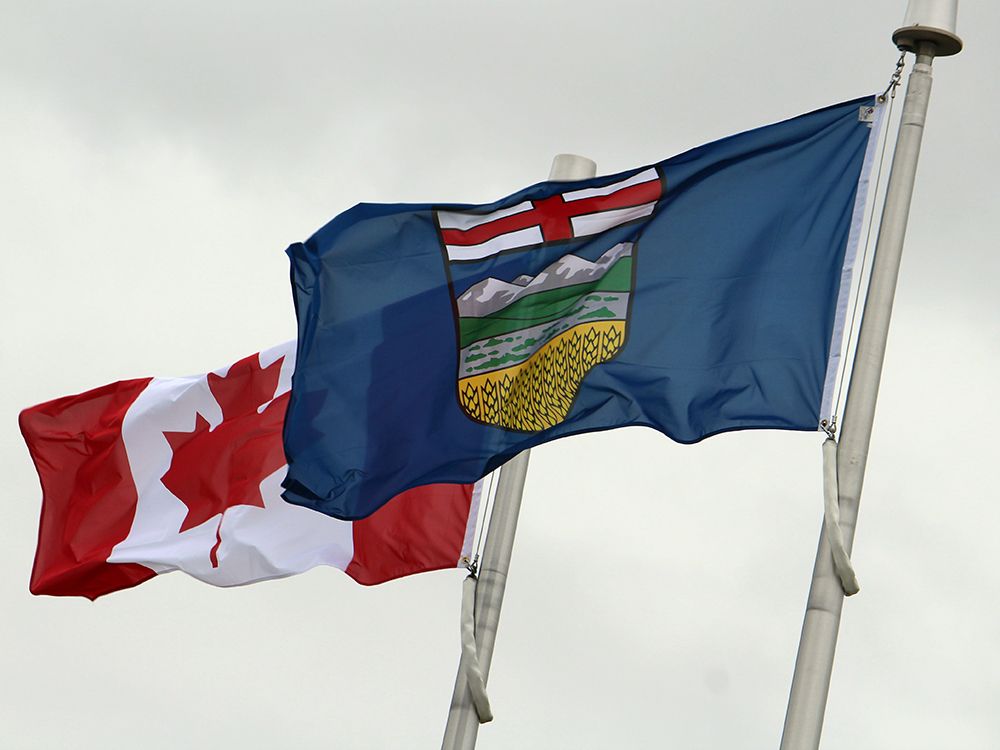
 nationalpost.com
nationalpost.com
While 52 per cent of Canadians think Alberta separation should be taken seriously, 42 per cent think Quebec separation should be taken seriously
As Alberta lurches towards a potential referendum on seceding from Canada, a majority of Canadians think the threat of separation should be taken seriously.
A new Leger poll for the Association for Canadian Studies shows that 52 per cent of Canadians believe the threats should be taken seriously — a view that’s held most strongly in Alberta itself.
“A lot more Canadians than I might have expected are taking the threat of Alberta separation — think we should take it — very seriously,” said Jack Jedwab, president and CEO of the Association for Canadian Studies. “And what is interesting with that is that they actually think that we should take the threat of Alberta separation more seriously than the threat of Quebec separation.”
While 52 per cent of Canadians think Alberta separation should be taken seriously, 42 per cent think Quebec separation should be taken seriously.
In recent months, Alberta Premier Danielle Smith has warned that the continuation of federal policy deemed unfriendly towards her province would precipitate an “unprecedented national unity crisis.” And, while a referendum on secession hasn’t happened in any province since Quebec’s last attempt in 1995, Smith has promised that if enough Albertans put their signatures on a petition, her government will facilitate it.
In Alberta itself, 63 per cent say the threat of secession should be taken seriously.
The concern level, however, is lower in the rest of the country. Fifty-one per cent of those in British Columbia agree, as do 54 per cent of those in Ontario, Manitoba and Saskatchewan. Quebecers are the least concerned: 46 per cent think it’s a serious threat. Half of Atlantic Canadians believe it’s a serious threat.
The view that Quebec separation should be taken seriously is held most strongly in Quebec at 47 per cent, followed by Ontario at 45 per cent. Thirty-eight per cent of those in British Columbia, Manitoba and Saskatchewan agree it’s a serious threat, while just 31 per cent of Albertans and 32 per cent of Atlantic Canadians think it’s serious.
“Quebecers, they feel the threat of Quebec separation is much more serious than the threat of separation from Alberta, and Alberta is the contrary. Albertans think their threat of separation is more serious than the threat of separation from Quebec,” said Jedwab.
Broadly speaking, a plurality of Canadians believe that the re-election of Prime Minister Mark Carney’s Liberal government will not lead to more national unity. Just 34 per cent believe that it will, compared to the 37 per cent that say it will not. However, a large minority of Canadians — 29 per cent — are undecided on what impact the Liberals will have on national unity.
Albertans believe most strongly, at 52 per cent, that the Liberals will not improve national unity, followed by Manitoba and Saskatchewan at 39 per cent, Quebec at 38 per cent, B.C. at 35 per cent, Atlantic Canada at 34 per cent and Ontario at 33 per cent. In every province, between roughly one-quarter and one-third of poll respondents believe the Liberals will improve national unity.
“It was a polarizing election, whether one likes it or not,” said Jedwab. “And given the regional dynamics of the Conservative party, I think that is giving rise to the view that there’s some challenges going forward with respect to unity, but we’ll have to see.”
These dire views of national unity are held most strongly by those who voted for Pierre Poilievre’s Conservative Party of Canada. Just 17 per cent of Conservative voters believe Carney will improve national unity. Quebecers who voted for the Bloc Québécois are similarly skeptical, with 21 per cent saying national unity will be improved. However, New Democrats (41 per cent) and Liberals (56 per cent) believe the new government will do good things on the national unity question.
Conservative voters are also far more likely to be concerned about Alberta separatism, with almost 64 per cent saying it should be taken seriously. But Liberal voters (48 per cent) and NDP voters (47 per cent) are also concerned, while Bloc voters, at roughly 32 per cent, are the least worried.
“We’ll have to see what the political implications are of that, because some of this is going to be seen as leveraging this type of sentiment to shift political power or political influence in the country,” said Jedwab.
There is a similar partisan divide when it comes to concerns about Quebec separation. Bloc voters, at almost 51 per cent, believe most strongly that it’s a serious threat. Conservative voters are the most sanguine, at 36 per cent, while 44 per cent of New Democrats and 45 per cent of Liberal voters think it should be taken seriously.
The majority of voters do not think there is a legitimate reason for either Quebec or Alberta to separate. Unsurprisingly, Alberta has the highest number of poll respondents (52 per cent) who think that Alberta has good reasons to go. But that view drops off sharply to 37 per cent in Manitoba and Saskatchewan, 34 per cent in Quebec, 32 per cent in Ontario and B.C., and 28 per cent in Atlantic Canada.
Again, support varies widely by partisan affiliation. Fifty-eight per cent of Conservatives think Alberta has legitimate reasons to leave, while 33 per cent of Bloc voters think there are good reasons. Among progressive voters, support is lower: 19 per cent of Liberals see legitimate grievances, as do 18 per cent of New Democrats.
The dynamics are similar with Quebec. Fifty-one per cent of those in La belle province think there are good reasons to leave Canada, but, again, support is limited elsewhere. Just 20 per cent of Atlantic Canadians think Quebec has legitimate reasons, as do 23 per cent of those in Manitoba and Saskatchewan, and 25 per cent of those in B.C. Support is slightly higher in Ontario (30 per cent) and Alberta (32 per cent).
Seventy-nine per cent of Bloc voters say the grievances are valid, compared to 34 per cent of Conservative voters and NDP voters, and 27 per cent of Liberals.
The online survey of 1,626 Canadians was conducted between May 1 and 3. A margin of error cannot be associated with a non-probability sample in a panel survey for comparison purposes. A probability sample of 1,626 respondents would have a margin of error of plus or minus 2.5 per cent, 19 times out of 20.

More than half of Canadians say Alberta separation should be taken seriously: poll
The polling shows that more Canadians fear Alberta separation than Quebec separation.
What's the point of a huge population if they can't come close to sustaining it?Quebec is poorer than other provinces. But very populous. Hence, the equalization payments. As a father, I would say I loved the 7$ daycare we voted for ourselves
it’s ridiculous and a great case on why more population is a bad thing.

Scott Moe on Instagram: "The federal government has announced equalization payments for 2025 and once again, SK, AB and BC will be helping support the rest of Canada."
948 likes, 160 comments - premierscottmoe on January 2, 2025: "The federal government has announced equalization payments for 2025 and once again, SK, AB and BC will be helping support the rest of Canada.".
 www.instagram.com
www.instagram.com
For the millionth time, Alberta cannot separate unilaterally. Alberta is Crown land; ie, property of Canada.
What are they going to do, declare war on the rest of Canada if we don't let them go?
What are they going to do, declare war on the rest of Canada if we don't let them go?
Alberta has long accused Ottawa of trying to destroy its oil industry. Here’s why that’s a dangerous mythNo, this is more about Smith misreading the room.
Published: May 8, 2025 7.13am EDT
Author
 Ian Urquhart
Ian Urquhart
Ian Urquhart is a Friend of The Conversation.
Professor Emeritus, Political Science, University of Alberta
“Alberta is a place soaked in self-deception.” Those words began Alberta-based journalist Mark Lisac’s 2004 book aimed at shattering the myths that have unhelpfully animated too much of Alberta’s politics over the past few decades.
Current and former Alberta politicians are once again embracing and treating separatist grievances seriously. That means it’s time once again to highlight and challenge political misconceptions that have the potential to destroy Canada.
Oil is the root of one such myth. The misconception? That Ottawa perenially opposes the oil and gas sector and is determined to stop its continued growth. The National Energy Program (1980), the Northern Gateway pipeline project (2016), the Energy East Pipeline (2017) and the proposed greenhouse gas pollution cap allegedly prove Ottawa’s hostility.
Notably missing from these grievances is the Keystone XL pipeline and the Trans Mountain Expansion Project. Ottawa supported these projects aimed at transporting Alberta oilsands crude to foreign markets. The federal government even purchased the Trans Mountain project from Kinder Morgan in 2018 — not to kill it, but to build it.
Read more: Justin Trudeau's risky gamble on the Trans Mountain pipeline
As for Keystone XL, Alberta Premier Jason Kenney thanked Prime Minister Justin Trudeau for supporting the project. This doesn’t fit the separatist narrative, so it’s largely ignored.
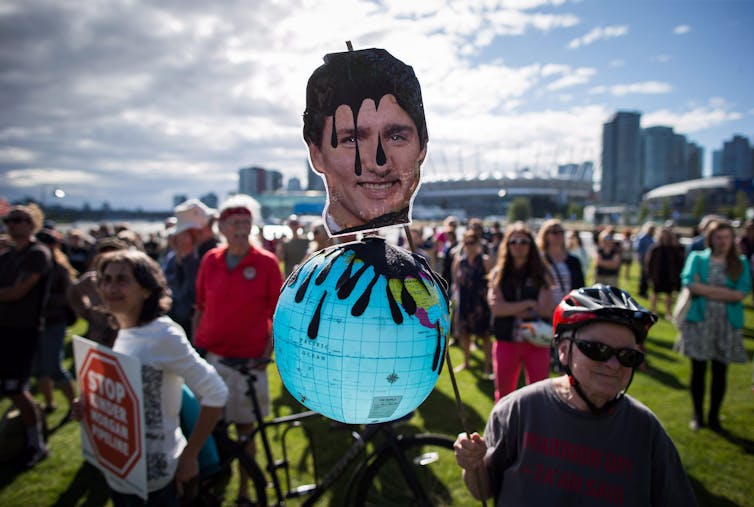
A protester holds a photo of an oil-soaked Prime Minister Justin Trudeau during a demonstration against the Kinder Morgan Trans Mountain Pipeline expansion in Vancouver in May 2018. THE CANADIAN PRESS/Darryl DyckOilsands booster
No one should dispute the National Energy Program’s devastating impact on Alberta’s conventional oil and gas sector 40 years ago. But the oilsands, not conventional oil, propelled Canada to its position as the world’s fourth largest oil producer.
Has Ottawa facilitated or obstructed the spectacular post-1990 growth of oilsands production?
The record shows that, since the mid-1970s, Ottawa has facilitated and supported the oilsands sector. The federal government helped keep the Syncrude project alive in 1975 when it took a 15 per cent interest in Canada’s second oilsands operation.
Ironically, Ottawa’s enthusiasm for more, not less, petroleum from the oilsands also appeared in 1980 via the National Energy Program (NEP), the devil in Alberta’s conservative catechism. What most accounts of the NEP don’t mention is that Ottawa offered tax benefits to oilsands companies while stripping them from conventional oil producers.
Furthermore, the NEP’s “made-in-Canada” pricing effectively guaranteed Syncrude would receive the world price for its production. At $38 per barrel, Syncrude received more than double what conventional producers received. If the NEP was harsh on conventional oil producers, it helped create a golden future for the oil sands.
In the mid-1990s, Ottawa helped propel the post-1995 oilsands boom. The industry-dominated National Task Force on Oil Sands Strategies sought federal tax concessions to promote oilsands growth. The federal government delivered them in its 1996 budget, despite Prime Minister Jean Chretien’s general concern with cutting the deficit.
Again, these measures clearly contradict the myth of federal opposition to the oil industry.
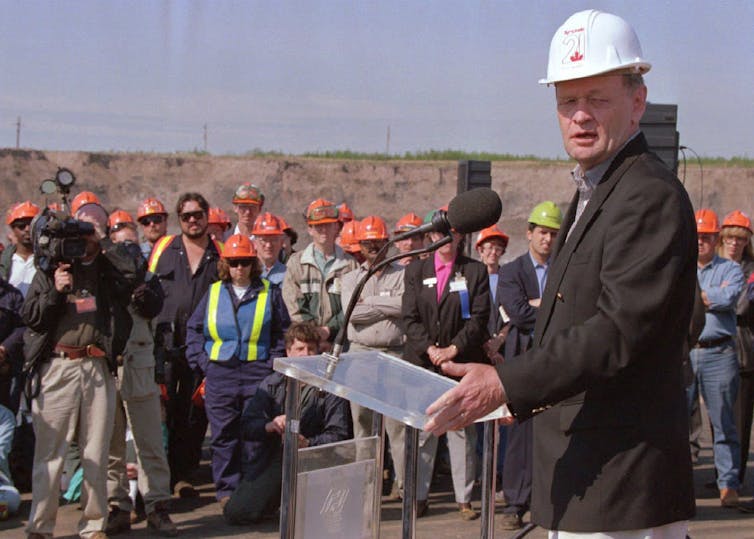
Prime Minister Jean Chretien talks to Syncrude workers at the open pit oilsands mine in Fort McMurray, Alta., in 1996 after he announced the signing of a $5 billion expansion in the oilsands by 18 of Canada’s largest oil companies. THE CANADIAN PRESS/Dave BustonGenerous emissions caps
Ottawa’s policy favouritism towards the oilsands didn’t end there. It has consistently animated the federal government’s treatment of the oilsands in its climate change policies.
The federal Climate Change Plan for Canada (2002) treated oil and gas leniently. Its measures for large industrial emitters bore a striking resemblance to the climate change policy preferences of the Canadian Association of Petroleum Producers. Suncor and Syncrude, the two leading oilsands producers, estimated these federal proposals would add a pittance, between 20 and 30 cents, to their per barrel production costs.
Justin Trudeau’s response to Alberta’s 2015 oilsands emissions cap also underlined Ottawa’s favouritism, not hostility, to the dominant player in Canada’s oil patch.
Rachel Notley’s NDP government set this cap at 100 million tonnes of GHG per year, plus another 10 million tonnes allowed to new upgrading and co-generation facilities. This cap was a whopping 39 million tonnes or 55 per cent higher than what the oilsands emitted in 2014.
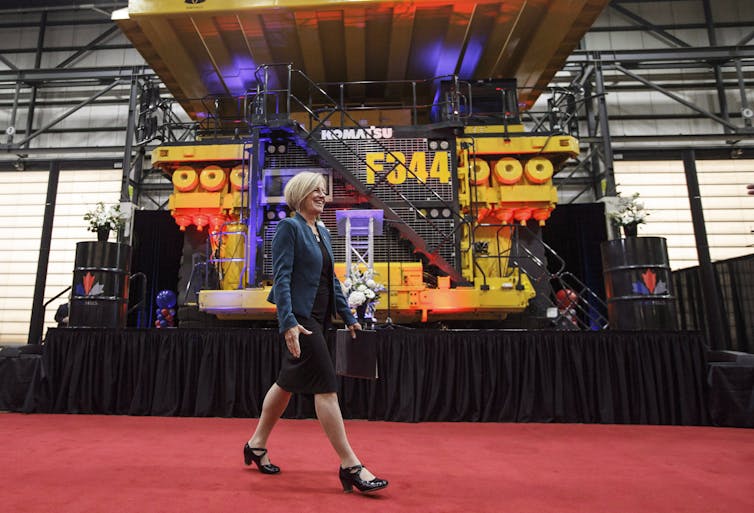
Alberta Premier Rachel Notley walks past a heavy hauler truck during the Suncor Fort Hills grand opening in Fort McMurray Alta, in September 2018. THE CANADIAN PRESS/Jason Franson
This generous cap contributed to a tremendous increase in oilsands production. Healthy profits became record profits in 2022. Ottawa embraced Alberta’s largesse, incorporating the province’s cap into its post-2015 climate policies.
Furthermore, Ottawa increased its leniency towards the oilsands by exempting new in-situ (non-mining) oilsands projects in Alberta from the federal Impact Assessment Act. This exemption applies until Alberta’s emissions cap is reached. Canada’s latest National Inventory Report on greenhouse gas emissions reported record oilsands GHG emissions of 89 million tonnes in 2023, still 11 million tonnes shy of the 100 million tonne threshold.
Weaponizing myths
Finally, we have today’s proposed national cap on greenhouse gas emissions. Alberta is apoplectic about the cap. But whether or not it’s intentional, Premier Danielle Smith’s outrage feeds into secessionist sentiment by seemingly misrepresenting the cap’s impact on oil and gas production.

Alberta Premier Danielle Smith at a news conference in Edmonton on April 29, 2025. THE CANADIAN PRESS/Jason Franson
Smith and her environment minister use the work of the Parliamentary Budgetary Officer (PBO) to nurture their “Ottawa hates oil” narrative. They claim the officer’s analysis of the cap’s economic impact showed it “will cut oil and gas production by five per cent, or more than 245,000 barrels per day.”
This is simply not true.
In fact, the PBO concluded that, with the cap, oilsands production “is projected to remain well above current levels” — 15 per cent higher than in 2022. The proposed federal emissions cap, like the Alberta NDP’s cap of a decade ago, is higher than current oilsands emissions levels. The PBO concluded the proposed ceiling for oilsands emissions would be six per cent higher than 2022 emissions.
Ottawa’s proposed cap, in fact, continues its decades-long support of the oilsands.
Myths are central to our being. When I tell my grandsons about the pot of gold at the end of the rainbow, I hope to inspire curiosity, imagination and interest in their grandmother’s Irish heritage.
But in politics, fanciful stories can be dangerous. Some weaponize myths, using the fictions at their core to encourage followers to let falsehoods rule their behaviour. That seems to be playing out yet again in Alberta. We must demand better from the political class.
Attachments
-
26 bytes Views: 0
Looks like the quislings are living out their 51state fantasy. lmao.
Opinion | Danielle Smith is playing with fire when she flirts with Alberta separation
Updated May 8, 2025 at 5:43 a.m.
May 6, 2025
3 min read
Save
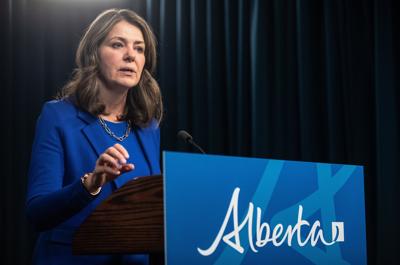
Alberta Premier Danielle Smith announces proposed changes to several pieces of democratic process legislation, in Edmonton on April 29, 2025.
JASON FRANSON/THE CANADIAN PRESS
By Bruce ArthurColumnist
Bruce Arthur is a columnist for the Star. Follow him on Twitter: @bruce_arthur.
One must be careful with live ammunition, explosives and nations. That was apparent as Prime Minister Mark Carney visited U.S. President and local madman Donald Trump at the White House Tuesday, which included some light chit-chat involving the future of Canada. It was one of several tense moments for the country of late.
But it’s not just Trump. Recently, Danielle Smith has begun playing with a special kind of fire. Last week, the premier of Alberta introduced a bill that would allow a separation referendum to be triggered by about 177,000 signatures, down from 600,000, and remove barriers to collecting signatures. She also chose the day before Carney’s visit to Washington to deliver a list of demands no responsible prime minister could grant: guaranteeing tri-coastal tidewater access for oil shipments (which requires negotiations with other provinces and First Nations), billions of dollars more in federal transfer payments, a repeal of Bill C-69, no more emissions cap or clean electricity regulations, a repeal of the industrial carbon price (first introduced in 2007/08 under Ed Stelmach), no trade-related withholding of energy, and more.
And the day before Carney went to Trump’s White House, Smith once again encouraged separation, in her soft-spoken, did-she-just-say-that way.
“There are thousands of Albertans who are so frustrated with the last 10 years of Ottawa’s attacks on their friends’ and family’s livelihoods that they feel Alberta would be stronger and more prosperous as an independent nation,” said Smith. “That is an understandable and justifiable feeling to have, even if we disagree on what to do about it. These Albertans are not traitors, nor should they ever be treated as such. They just love their province and family, and want a better future than the one Ottawa is offering them right now.”
Smith failed to mention that oil production is at record highs in Alberta, but did imply federal policies are killing Albertans and their families. God, it was disingenuous. All separatists are, by definition, traitors to their country. At least Quebec separatists were fairly straightforward: they wanted to break up Canada and go it alone. Smith, meanwhile, half-pretends she is a bystander. It’s like hearing an arsonist say, I am not in control of the fire I set because that fire will follow its own path, but I will respect the fire’s decision.
And the fire is a worry. Yes, the number of Albertans who support separatism hovers around 25 to 30 per cent in most polls. No, Alberta could not unilaterally secede, even with a yes vote. Yes, treaties with First Nations are a question. There are plenty of barriers, and it’s possible that losing a referendum puts the idea to bed for a generation or two. That’s the best case.
And yes, maybe this is all a big dumbshow to distract from Smith’s problems: an easy-to-follow, hard-to-escape health-care scandal, deeply undemocratic electoral changes, a tax cut just before WTI oil prices plummeted earlier this year, and a potential recession yet to come. Watch for an early election, maybe.
Whatever the reason, it’s the reckless, dangerous stuff of modern right-wing populism: a weakening of the country at a critical time, and a bug light for foreign interference. As Alberta NDP Leader Naheed Nenshi put it on Ryan Jespersen’s radio show, “They just pick fights all the time because that’s what keeps their base excited and keeps their base going. But when you start picking these fights all the time, you start something you might not be able to control.” Nenshi, coincidentally, says he was in the room when then-British prime minister David Cameron told European leaders that he was going to go ahead with the Brexit referendum. Nobody expected Brexit to win.
Quebec’s flirtation with separation damaged the province’s economy, and especially Montreal. Brexit kicked the crap out of the British economy for no good reason. Trump’s first election was a national cry for help; his second election might yet become a national murder-suicide pact.
ARTICLE CONTINUES BELOW
And at a time when an Albertan prime minister has signalled more openness to fossil fuel expansion than at any point in decades, here comes Smith with a clumsy attempt at a better federal-provincial deal. In Washington, Carney was asked about a referendum, and was disappointingly soft: “Well, Canada is stronger when we work together,” he said. “As an Albertan, I firmly believe that you can always ask a question, but I know what I would respond to it with.” He was slightly better in French, but he’ll need to do better than that.
Canada still has a right-wing grievance problem. Smith’s United Conservative Party, like B.C.’s Conservative party on one side and the Saskatchewan Party on the other, is increasingly unmooring itself from the real world, but is very sensitive if you mention it. Federal Conservative Leader Pierre Poilievre has parachuted into an Alberta riding that might include strong support for separation. And now Smith is playing with matches in the country’s biggest gas station.
At least Doug Ford, when he’s not proposing tunnels to nowhere, has it right. But it’s difficult enough that Carney has to deal with Trump’s unhinged threats to erase the border, or break the country. With Smith, the call comes from inside the house.
Albertan NDP Leader really blasts Danielle Smith, and I agree with this statement of his below. You can lump the righties who think that she is doing the "right thing" in these trying times when Canada should be United......something that even Doug Ford agrees with it:
'How dumb does she think we are?': Nenshi on Smith | Alberta Primetime
'How dumb does she think we are?': Nenshi on Smith | Alberta Primetime
you will always look to spread unfavourable opinions about capitalismYou're missing a layer: Trump screwing up his economy is cratering world oil prices. Breakeven for oil sands is more than $50-$75 WTI
Oil Supply Costs | oilandgasinfo.ca
oilandgasinfo.ca
WTI is $60 and falling.

Alberta only makes money when oil prices are high. Between Trump and OPEC, there's potential for cheap oil prices for the next 5-7 years. Then AB will be looking for those east coast elites to put diesel in their F250's for them.
but you are wrong again
this was in November

Where Will Suncor Stock Be in 1 Year?
Suncor Energy Inc (TSX:SU) stock is doing well this year. Will it still be doing well next year?
this was in marchSuncor only needs about US$43 per barrel of West Texas Intermediate crude to break even.
Rating Report
Suncor Energy Inc.
Thu 20 Mar, 2025 - 12:29 PM ET
Suncor Energy Inc. (BBB+/Stable) has a strong credit profile due to its large upstream production, integration in oil refining and fuel marketing, and conservative financial policy. In 2024, Suncor increased production by 11% to 828 kb/d and reduced its breakeven oil price by USD7/bbl. The company aims to further reduce its breakeven price by USD10/bbl by 2026.
western alienation is just an excuse that western politicians use to cover for their own shortcomings........ I heard the Edmonton Oiler fans sing O Canada tonight... loud and proud!Can't blame Alberta for wanting out.
They've been getting screwed over for far too long.
Last thing I'd ever want is to part of the USA.
But if these things happen I'll be too old to immigrate to a decent country.
Canadian citizens singing the Canadian National anthem......shame on them.western alienation is just an excuse that western politicians use to cover for their own shortcomings........ I heard the Edmonton Oiler fans sing O Canada tonight... loud and proud!
I appreciate that you've become a fan, but you know how averages work, right?you will always look to spread unfavourable opinions about capitalism
but you are wrong again
this was in November

Where Will Suncor Stock Be in 1 Year?
Suncor Energy Inc (TSX:SU) stock is doing well this year. Will it still be doing well next year?www.fool.ca
this was in march
Rating Report
Suncor Energy Inc.
Thu 20 Mar, 2025 - 12:29 PM ET
Suncor Energy Inc. (BBB+/Stable) has a strong credit profile due to its large upstream production, integration in oil refining and fuel marketing, and conservative financial policy. In 2024, Suncor increased production by 11% to 828 kb/d and reduced its breakeven oil price by USD7/bbl. The company aims to further reduce its breakeven price by USD10/bbl by 2026.
When I say the average is between 50 and 75, and you post 1 company slightly below the average it supports my statement about the average. About half of the oil can be produced below the average, and about half of the oil is produced above the average.
And what do we do for those companies producing at 60 or 70 or 90? Do we do the capitalist thing and let them die, or do we do the neoliberal thing and bail them out with some of the 29.6 Billion dollars of subsides we give oil and gas cos every year.
But wait! I thought Alberta didn't get anything from federalism! Also: i thought Albertans were proud individuals, surely our proud, strong oil and gas companies wouldn't take socialist handouts from the government!
Turns out today's capitalism is just socialism for the wealthy, feudalism for everyone else.
The oil$gas industry is only about 3-5% of our GDP but eats up about $30 billion in subsidies.I appreciate that you've become a fan, but you know how averages work, right?
When I say the average is between 50 and 75, and you post 1 company slightly below the average it supports my statement about the average. About half of the oil can be produced below the average, and about half of the oil is produced above the average.
And what do we do for those companies producing at 60 or 70 or 90? Do we do the capitalist thing and let them die, or do we do the neoliberal thing and bail them out with some of the 29.6 Billion dollars of subsides we give oil and gas cos every year.
But wait! I thought Alberta didn't get anything from federalism! Also: i thought Albertans were proud individuals, surely our proud, strong oil and gas companies wouldn't take socialist handouts from the government!
Turns out today's capitalism is just socialism for the wealthy, feudalism for everyone else.
The rest of Canada would be better off without sending oil$gas so much money.
Danielle Smith keeps insisting that she is really rooting for Canada while promoting this model of "Sovereignty-Association", reminiscent of Renee and the caricature of "SOV-ASS". That second referendum came pretty close to breaking up a country.No, this is more about Smith misreading the room.
Alberta’s wishy-washy dance with separatism will beggar the province
Israr Ahmad
Special to The Globe and Mail
Published May 9, 2025
Open this photo in gallery:
Alberta Premier Danielle Smith announces proposed changes to several pieces of democratic process legislation, in Edmonton on April 29.JASON FRANSON/The Canadian Press
304 Comments
Israr Ahmad is a Canada-based climate policy and energy transition investment professional.
Alberta’s leadership is playing a high-stakes game of ambiguity, and the province is stuck in the middle. On one hand, Premier Danielle Smith and her party regularly flirt with separatist language-invoking sovereignty, slamming Ottawa, and easing the rules for triggering a referendum. On the other, they refuse to clearly commit to the one thing that would provide certainty: a straightforward vote on whether Alberta should stay in Canada.
Instead, we’re being asked to endure a 120-day petition drive requiring 177,000 signatures to potentially – potentially – put the question to a referendum. It’s political hedgework disguised as process. And while it may offer short-term applause lines, it’s creating long-term damage – both to Alberta’s economic credibility and to the idea of leadership itself.
Let’s be honest about what this is. The government doesn’t want to own the referendum. It wants to be pushed into it, to blame the people for asking, to stay a step removed from the consequences. That’s not governance. That’s cowardice.
The most troubling part? This manufactured ambiguity is bleeding into Alberta’s economic narrative. Investment decisions rely on predictability. If you’re weighing a billion-dollar project, you’re not just looking at resource potential, you’re looking at political risk. Right now, Alberta is signalling that its relationship with the country it exists within is up for grabs. No business likes that kind of signal.
The government knows this. It knows that long-term capital doesn’t like cliffhangers. It knows that institutional investors don’t budget for constitutional uncertainty. But it keeps the dance going because the performance plays well to a certain audience. Unfortunately, that performance is going to cost Alberta real money and real confidence.
This isn’t an argument against asking the question. It’s an argument against not asking it. Because in this kind of political theatre, the threat is often more destabilizing than the outcome. Ask Quebec. The two referendums there created national tension, yes – but they also forced clarity. They gave voters the respect of a direct question. And once asked, they deflated years of ambient posturing. Alberta, by contrast, is trying to wield the weight of a referendum without the honesty of holding one.
If Ms. Smith truly believes Ottawa has failed Alberta, she should make the case and campaign for separation. If she doesn’t, she should stop playing coy and say so. But standing behind a petition drive, hoping someone else triggers the reckoning – while reaping the headlines of confrontation – isn’t a strategy. It’s avoidance in costume.
Alberta has real challenges ahead. A resource-heavy economy that is navigating energy transition. A tech sector trying to emerge. A work force struggling with affordability. None of these benefit from a prolonged guessing game about the province’s national future. We don’t need a slow-drip referendum prequel. We need a decision. A real one.
It’s easy to talk about standing up to Ottawa. It’s harder to stand up for something concrete. Right now, this government is trying to ride both sides of the fence – galvanizing separatist sentiment without ever committing to the fallout. But if this question is worth asking, then ask it. And if it’s not, say so, and stop using it as rhetorical currency.
00:07 / 00:15
Leadership means taking positions. It means making choices when they matter, not outsourcing them when they get complicated. Albertans deserve a clear answer, not another political bait-and-switch or another phase of strategic delay. A petition is not a referendum. If you want a mandate, seek it. If not, stop pretending one is always just over the horizon.
Hold the vote. Or hold your fire. But enough of this in-between act. It’s not just indecisive – it’s reckless.
lets be clearI appreciate that you've become a fan, but you know how averages work, right?
1.i am not a fan
2. you do not have a clue how resilient this industry is
they have survived commodity price volatility before and will do so again
what they can not survive is the Trudeau family and the Liberal Party of Canada
Suncor is one of the biggest oil sands operatorsWhen I say the average is between 50 and 75, and you post 1 company slightly below the average it supports my statement about the average. About half of the oil can be produced below the average, and about half of the oil is produced above the average.
CNQ, CVE and IMO, are also well capitalized, diversified and well managed , constantly working and investing to lower operating costs
that subside nonsense is misleading bullshitAnd what do we do for those companies producing at 60 or 70 or 90? Do we do the capitalist thing and let them die, or do we do the neoliberal thing and bail them out with some of the 29.6 Billion dollars of subsides we give oil and gas cos every year.
it is predominantly some ignorant eco warriors estimate of forgone taxes due to capital cost allowances for investments in the company
capital cost allowances are available to all companies in Canada like Bombardier and SNC , Brookfield
let us know when you truly understand what you call subsidies in stead of regurgitating eco warrior nonsense
the cash flow is from the oil and gas industry to govt via royalties, taxes, economic spin off etc and is huge $
you are truly clueless
But wait! I thought Alberta didn't get anything from federalism! Also: i thought Albertans were proud individuals, surely our proud, strong oil and gas companies wouldn't take socialist handouts from the government!

if you were not truly clueless you would know Alberta and Saskatchewan are cash cows for the country contributing disproportionately to the CPP program
while watching Quebec take massive equalization payments

that is just plain stupid ignorant commie claptrap nonsenseTurns out today's capitalism is just socialism for the wealthy, feudalism for everyone else.
Last edited:
when two provinces are stating their people are considering separation it is best to start listening to them rather continue to pile on the anti-oil rhetoric
if they separate, the entire country will unravel and Trump would pick off provinces one at a time
i am pretty sure 99%+ of Canadians do not want to see that happen
if they separate, the entire country will unravel and Trump would pick off provinces one at a time
i am pretty sure 99%+ of Canadians do not want to see that happen
The liberals Bill C-69 , carbon taxes and disregard for the western province interest is what is recklessDanielle Smith keeps insisting that she is really rooting for Canada while promoting this model of "Sovereignty-Association", reminiscent of Renee and the caricature of "SOV-ASS". That second referendum came pretty close to breaking up a country.
Alberta’s wishy-washy dance with separatism will beggar the province
Israr Ahmad
Special to The Globe and Mail
Published May 9, 2025
blah blah, blah
It’s not just indecisive – it’s reckless.
Quebec has been extorting Canada with wishy-washy separatism for 50 years
that strategy appears to have worked







